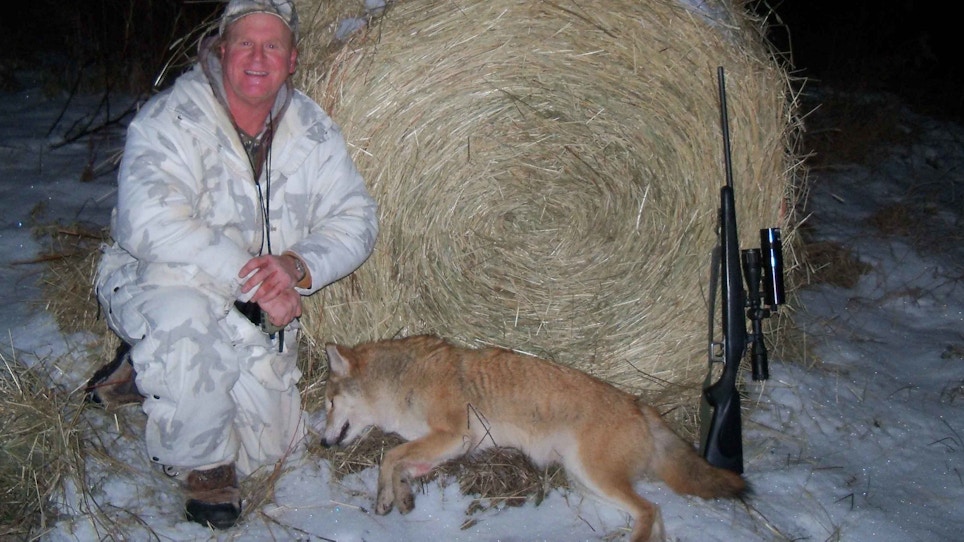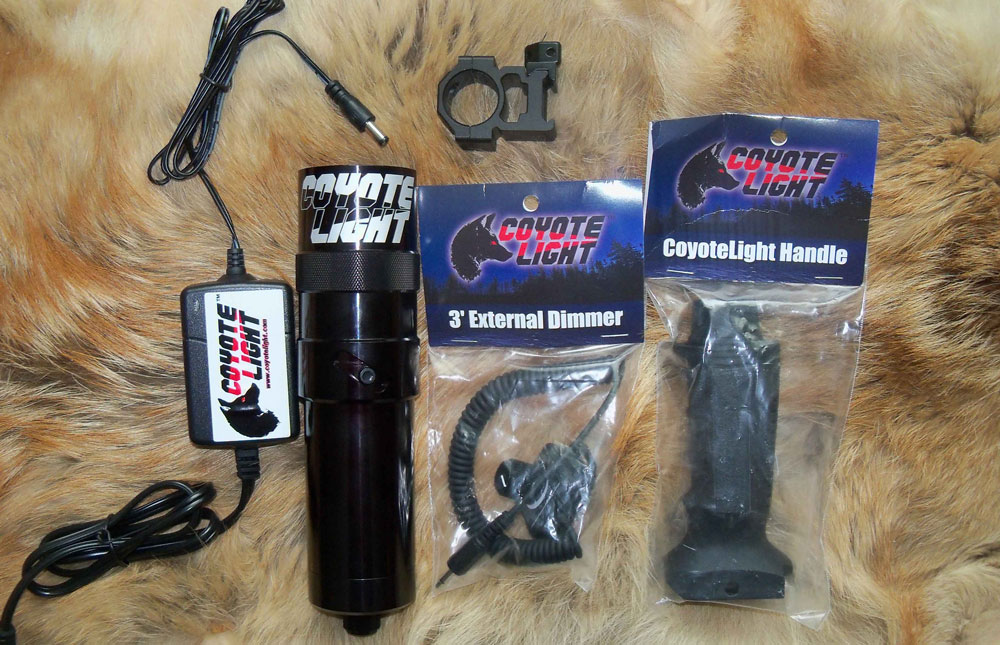Anticipation for a predator hunt often runs high. That same eagerness is magnified when you have a new piece of hunting gear to try out. On this particular January night, I was using the second-generation CoyoteLight.
A short 15-minute ride placed me at the first stand of the night. I set up on a knoll in the middle of a snow-covered field and placed my FOXPRO Fury call 40 yards in front of me in the 10 o’clock position. Baybee Cottontail had only played for a few seconds when I detected the glowing eyes from a pair of coyotes. “Oh, no,” I thought. “The wind is wrong!” Sure enough, both coyotes caught my scent cone and fled into the nearby brush — never to be seen again.
I continued to scan the terrain and was thrilled to see another pair of coyotes emerge from the opposite side of the field. Knowing these coyotes would soon wind me as well, I quickly transitioned to my scope-mounted CoyoteLight to find the approaching coyotes. Even though both coyotes were located clear across the field, I could easily find them in the scope. In fact, it was not only the eyes I had detected — it was the entire body! I estimated the distance to be approximately 250 yards, which was within range of my Remington 700 chambered in .223. Under the beam of the CoyoteLight, I settled the reticle on the lead coyote’s chest and took the shot. To my delight, the coyote dropped on the spot. My first thought was I would not have been able to take such a long shot as easily with the shooting lights I had been previously been using. The CoyoteLight’s brightness allowed me to take an extended shot with so much ease it was almost like shooting in daylight.
I’ve been hunting nocturnal predators since 1985, and during that time I have experienced the evolution of the hunting light. From the old auto store 6-volt handheld cordless spotlights to the latest LED flashlights, I have used nearly every type of lighting devices made available to night hunters. Field-testing the CoyoteLight proved to be a rewarding experience.
Brightness
The previously mentioned hunt proved the CoyoteLight is bright. While a lumen rating is often used to determine brightness, it is often misrepresented. Lux, as a measure, is more valid, and the CoyoteLight is measured at 39,000 lux. Numbers aside, I know while using the CoyoteLight predators’ eyes can be detected at over 800 yards. This is a great advantage for hunters who like to spot predators at long distances and prepare for a shot as the predator completes its approach. I could positively identify predator bodies at distances up to 300 yards.
Versatility
The CoyoteLight can be used as a hand-held scanning light or as a monopod-mounted scanning light. An ergonomic handle is available for hunters who wish to scan while holding the light in their hand. I use the light as a scope-mounted shooting light. The light is mounted to a scope ring, which is included, and attaches to a Picatinny rail found on the light housing.
No matter how the light is used, it has a nice feature for scanning the terrain. The beam is adjustable by rotating the aluminum housing. A simple ¼ twist will vary the beam from a wide flood to a tight beam. This feature will allow hunters to customize the width of the beam to their personal liking. For me, this feature also proved helpful on a frigid January hunt. While scanning the terrain, I detected the eyes of a rapidly approaching predator. I switched to the scope-mounted CoyoteLight in anticipation of the shot. The critter was hidden behind a knoll in the field, and seconds seemed like minutes as I waited for it to come into view. Thinking the predator might move across the field in an attempt to catch my scent, I rotated the light housing to produce a wider beam of light. Sure enough, the predator had swung downwind. I rotated the housing so the light beam was narrow and focused solely on what I could now identify as a coyote. I did not let the coyote progress any further and took the 100-yard shot at the broadside coyote.
The beam is also adjustable in terms of light intensity. A rheostat knob is conveniently located at the back of the light so hunters can easily turn and adjust the beam — even while wearing gloves. This is an attractive feature for hunters who wish to follow the eyes of a predator as it approaches the setup while under the glow of a less intense light beam and then increase the intensity to fully illuminate the predator prior to taking the shot.
That is exactly what I did on my second field test with the light. I picked up the reflective eyes of a red fox at 150 yards with my scanning light and instantly switched over to the scope-mounted CoyoteLight. Purposely, I turned the rheostat knob ¼ turn so the light was bright enough to reflect the eyes of the rapidly approaching red fox. As the fox closed the distance, I turned the knob to increase intensity. The fox was not at all bothered by the increasing intensity of the red LED light beam. Once, the entire body of the fox was clearly visible I took an easy 50-yard shot.
Battery life
For many hunters, battery life is one of the most important criteria when selecting a light. Nothing is worse than having a scanning light or shooting light die in the middle of a stand. The CoyoteLight gives new meaning to long battery life and all but eliminates this dilemma. The light boasts of battery life that is quite impressive — allowing 5½ hours while using the light under high power. This is how I typically use the light as it is mounted for the shot. Users can expect 20 hours of battery life when using the light at 75 percent of maximum and a staggering 48 hours of use when running the light at 25 percent of maximum intensity.
Another feature is a low-battery indicator light, which will glow to alert hunters that the batteries need charging. During my testing — including several marathon all-night hunts in sub-freezing weather — the indicator light never came on. Even though the instructions warned of using the light in cold temperatures, the light performed perfectly in single-digit temperatures during my field tests.
Built-In Ingenuity
We all work hard to bring predators into our setups. That is why it is so frustrating when they spook as they make their final approach because they notice extraneous light around the hunter or even around the vicinity of the predator. Night hunters have long searched for the best possible way to prevent light “splash” from their scanning and shooting lights. Hunters have used everything from toilet paper tubes to painted PVC pipes in their quest of abolishing light splash. The CoyoteLight features a built-in splashguard, which eliminates this extra light that is so detrimental to success. The light’s beam is projected away from the hunter without illuminating the area around the hunter and it doesn’t light up vegetation around the predator, which might cause the predator to spook.
Conclusion
Over the course of the season, I experienced many successful night hunts while using the CoyoteLight. Those hunts made me realize the CoyoteLight might be the best light I’ve used. From the standpoint of durability, convenience and brightness, the light is tough to beat. For the discriminating night hunter who demands top-of-the-line gear, the CoyoteLight is an excellent choice.
CoyoteLight Features
Precision-machined high-grade 6061 aluminum housing
Lightweight at 1.2 pounds
Variable focus and beam intensity
65,000-hour red LED emitter (also available in white and green)
Three high-performance lithium ion batteries
Low-battery indicator
Incorporated splashguard to minimize light spray
Made in the USA
One-year warranty
MSRP $429







